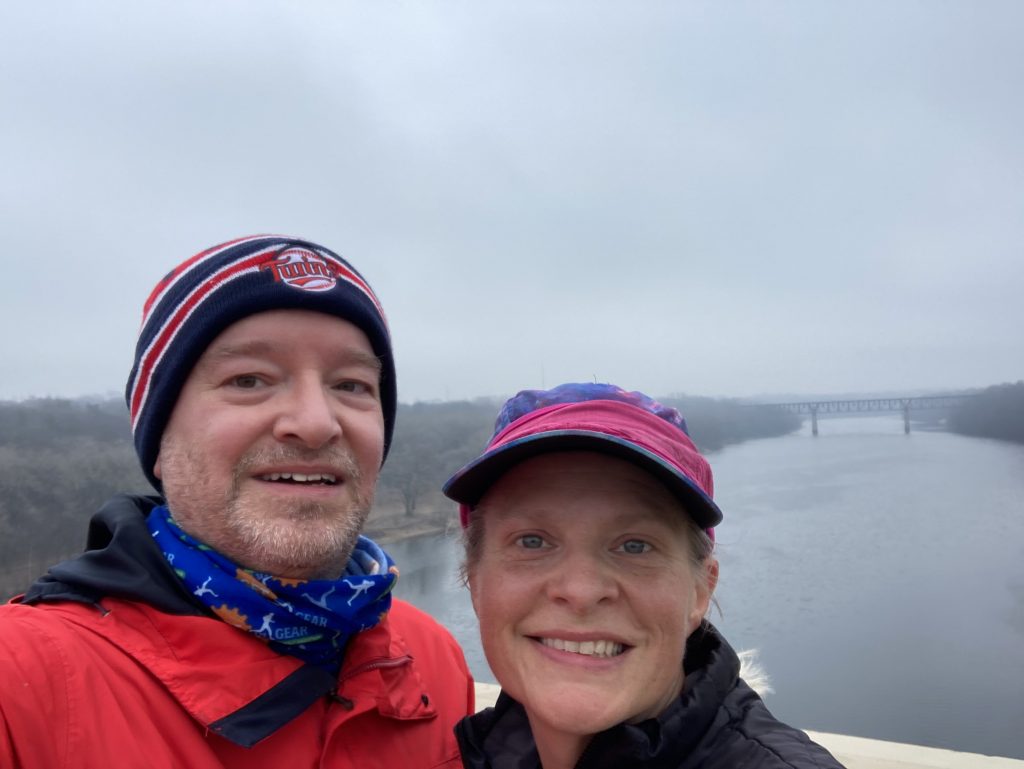4.15 miles
bottom of franklin hill (short)
32 degrees
Another Saturday run with Scott. Last night, we got a light dusting of snow which made everything frosty and a little slick at the start. Scott talked about the latest mash-up he’s arranging with the theme from Taxi and Green Day’s Brain Stew, Chicago’s 25 or 6 to 4. Then I talked about my latest focus on doors and windows and how it is allowing me to engage with things (poems, essays, ideas) that I’ve collected previously but were buried in a file folder or a log entry.
As we ran down the hill I mentioned something I had read in an essay by George Orwell, Why I Write. He describes how when he was an undergrad at Berkeley* he wanted to be an intellectual, but when he was supposed to be reading Hegel he would always be looking out the window, admiring the flowers instead.
*Scott didn’t hear anything after I said Orwell went to Berkeley; he was confused, believing that Orwell never left England. I checked the essay when I got home and realized that there were two versions of “Why I Write” in the document, one by Orwell, one by Joan Didion. The reference to Berkeley was from Joan Didion. Sometimes I get frustrated with Scott’s attention to details, but he’s usually right and I’m grateful that he caught this mistake (which was my fault, but not totally; the essays were placed one after the other in a document that was not well marked. His almost always being right can be irritating, but that’s more my problem than his, I guess.
Here’s the quote:
During the years when I was an undergraduate at Berkeley I tried, with a kind of hopeless late-adolescent energy, to buy some temporary visa into the world of ideas, to forge for myself a mind that could deal with the abstract.
In short I tried to think. I failed. My attention veered inexorably back to the specific, to the tangible, to what was generally considered, by everyone I knew then and for that matter have known since, the peripheral.
Why I Write/ Joan Didion
I love her mention of the peripheral. That’s where I spend all of my time too — literally and figuratively.
10 Things
- stretches of the trail were slick and my feet slipped a few times
- the knocking of a woodpecker — the sound echoed through an empty field
- the ice chunks on the river yesterday had melted and were replaced with swirls of foam
- the quiet thuds of a faster runner approaching from behind
- after he passed us, he kicked a big branch off to the side (we were grateful and impressed that he was able to do it while running fast down the hill)
- there was a thin layer of snow on the top of the concrete wall next to the river
- the suspended path on the other side — in the east river flats — looked inviting — I’d like to run it before it’s closed for the winter — maybe it already is?
- passing by the ghost bike hanging from the trestle
- the curved fence above the big sewer pipe was easy to see below us — no more leaves blocking our view
- passing a guy walking a dog on the sidewalk, saying good morning — realizing it was not morning but afternoon — 12:30 — we went out for the run a little later than usual
At the bottom of the franklin hill, Scott used my phone to take some video of the foamy, fast-moving water. Here’s a short clip:
Here are two passages from Virginia Woolf’s Street Haunting that include windows and doors:
But when the door shuts on us, all that vanishes. The shell–like covering which our souls have excreted to house themselves, to make for themselves a shape distinct from others, is broken, and there is left of all these wrinkles and roughnesses a central oyster of perceptiveness, an enormous eye. How beautiful a street is in winter! It is at once revealed and obscured. Here vaguely one can trace symmetrical straight avenues of doors and windows; here under the lamps are floating islands of pale light through which pass quickly bright men and women, who, for all their poverty and shabbiness, wear a certain look of unreality, an air of triumph, as if they had given life the slip, so that life, deceived of her prey, blunders on without them. But, after all, we are only gliding smoothly on the surface. The eye is not a miner, not a diver, not a seeker after buried treasure. It floats us smoothly down a stream; resting, pausing, the brain sleeps perhaps as it looks.
—
That is true: to escape is the greatest of pleasures; street haunting in winter the greatest of adventures. Still as we approach our own doorstep again, it is comfortingto feel the old possessions, the old prejudices, fold us round; and the self, which has been blown about at so many street corners, which has battered like a moth at the flame of so many inaccessible lanterns, sheltered and enclosed. Here again is the usual door
